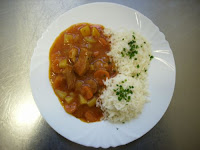
My mother shows her love with meat. Some mothers show their love with clothing, others with supportive hugs, some with useful goods such as irons and coffeemakers. My mother has done all of that, but like far more mothers, she shows her love with food. Mine in particular chose red meat. Birthdays, holidays, days offs, Sundays, it's always been similar: bacon frying, sausage grilled with peppers and onions for sandwiches, thick burgers topped with bleu cheese, tender steaks, barbecued ribs dripping in sauce and so tender they fall off the bone. I believe this is tradition handed down many years. Is is the very thread that runs through generations past, through my maternal Slavic, Germanic, Hungarian, and Romani ancestors who provided, when they could, a meal of meat.
Perhaps this is why I ultimately could not survive as a vegetarian, especially when I found myself in the motherland of the Czech Republic, the pangs of my mother and my Czech roots pulling me away from processed vegetable balls in sauce towards the succulent pork tenderloin medallions bathing in gravy and topped with raspberry preserve and cream and surrounded by thick dumplings. This was Svickova, a traditional Czech dish with a smell so rich and delicious, I put in a request that night to be switched from the vegetarian option to the meat one. This was Czech love, I could feel it, and I was missing out. I had only been a vegetarian for three months, but those three months couldn't have been forgotten sooner.
In Prague, if I ever felt homesick, all I needed to do was walk outside, and I was covered in the meat love of home. On the street, I could buy delectable, swollen, greasy sausages (klobasa) that snapped when you bit into them for less than a dollar. In restaurants, I ordered the requisite 'pivo' or beer that came in huge mugs that demanded meat dishes of beer gulash with dumplings ( hovězí guláš s knedlíkem), roast pork with cabbage and dumplings (vepřo-knedlo-zelo), pork schnitzel, (smažený vepřový říze), and fried cheese (smažený syr) with boiled tartaroes and tatar sauce, so rich it fell into the meat category. The Czech language with its 'zuhs,' and 'shus' and constants filled up my mouth with the same satisfaction as the food. I became obsessed.
After several months of tutoring a Czech boxing promoter in English, I finally had the nerve to ask about an old recipe that my Grandfather had referred to in Czech, which he had inherited from his mother called "michanice" meaning a 'medley' or a 'hodgepodge.' My mother explained it as 'depression' food, a stew of whatever was around ('everything but the kitchen sink' food). My mother served it the same way every time, a stew of beans, noodles, paprika, catchup, onions, and ground beef that cooked for hours. It became the ultimate winter soul food that I craved.
The boxing promoter said that michanice is made with 'eggs, potatoes, anything.' An odd contrast to the michanice that I ate at home.
'Can I get it at a restaurant?' I asked.
'No,' he said, 'it is now illegal in Czech Republic.'
I was shocked. My only Czech food connection was illegal. He explained that chefs could put in any kind of old, spoiled vegetables or meat into the stew, and cheat people. After asking other Czechs, I determined that every Czech has a version of 'michanice.' My family's version is, our course, includes red meat.

And so it is, that I crave meat as a connection now not only to my mom and my family, but also to Prague.
No comments:
Post a Comment